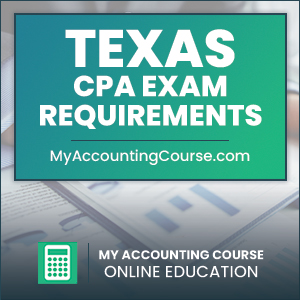 Texas is another state that requires 150 credit hours to take the exam. Candidates must also have at least a bachelor’s degree in order to sit.
Texas is another state that requires 150 credit hours to take the exam. Candidates must also have at least a bachelor’s degree in order to sit.
The rest of TX rules are pretty standard with the exception of its ethics requirement in which the standard AICPA exam is replaced with the TX Rules of Professional Conduct.
Let’s take a look at what you need to do to take the exam and get licensed.
Texas CPA Exam Requirements
Contents [show]
In order to be eligible to sit for the exam in Texas, candidates must meet the following personal qualifications and educational requirements.
- No minimum age limit
- Not Required to be a US citizen
- Not Required to be a TX resident
- Valid Social Security Number Required
- TX does participate in the International Examination Program
Educational Requirements to Sit
Texas rules mandate that you must complete an undergraduate degree along with 150 college credit hours before you can take the exam. Here are the details.
Bachelor’s Degree or higher (at least 150 semester hours) including:
- 30 credit hours of upper level Accounting courses
- 24 credit hours of General Business courses including:
- 2 hours of taxation or research
- 2 hours of business communication
- A 3 hour TX approved ethics course
Unfortunately, Texas does not have a provision for student to sit before they have completed their 150 hours. Sorry guys.
You will need to complete your CPA educational requirements before you can take the CPA exam.
Exam Fees
The total cost to take the CPA exam in Texas is $779.08 including an initial one-time $50 application fee. The cost for each section is listed below.
| AUD – Audit | $192.03 |
| FAR – Financial Accounting and Reporting | $192.03 |
| BEC – Business Environment and Concepts | $172.51 |
| REG – Regulation | $172.51 |
The CPA exam fees vary with section depending on their length. Since AUD and FAR are the longest tests, their fees are slighter higher than REG and BEC.
CPA Tip – This is where I usually tell people to only sign up for the exams you are currently going to take because the notice to sit will expire in 6 months. Since the TX re-registration application fee is only $20, I wouldn’t be too worried about it. There still isn’t a reason why you need to pay more though, so only sign up for the exams that you are ready to sit for in the next 6 months.
CPA License Requirements
The CPA exam process is involved and overwhelming for first time applicants. Don’t worry. You can do it! Applying for the test is just the first step in becoming a CPA in TX. After you pass the exam, here are the things you need to do before you can truly call yourself a Certified Public Accountant.
Pass the Exam
You’ll have to pass all four sections of the exam with a score of at least 75 in an 18-month period.
Paperwork
Submit all the required paperwork to the state board usually includes transcripts, license application, and proof of work experience.
Fees
Pay the $50 license/certification fees with your application.
Ethics Exam
Texas does not require you to take the AICPA ethics exam. Instead, you’ll have to pass the TX state exam and take a 3-hour ethics course approved by the state. This can also count for CPE!
Additional Education
There are no additional education courses that you need to complete after you have reached the 150 required to take the exam.
Work Experience Requirements
Texas’ one-year work program is pretty straightforward. They do accept self employment experience under a conditional basis as long as its approved ahead of time by the state board. Here is what you need to complete:
1-year or 2,000 hours of general accounting and auditing skills in Public Accounting, Private Industry, or Educational setting supervised and verified by a CPA.
The in order to meet the CPA work experience qualifications, 2,000 hours of your work experience must be completed no earlier than 1 year or later than 3 years of passing the exam.
More Texas CPA Exam Resources
The initial application process is kind of daunting especially if you attended more than one college. The Texas state board will need evidence of all of your education. You will need to mail in transcripts from every college you’ve attended.
That is why I suggest contacting the state board during the application process. They will let you know what they have on file and what they need before your application can be approved. Believe me. There is nothing worse than finding out you forgot something at the end of the process.
Unfortunately, most state boards rarely notify you that something is missing. Things can get lost or forgotten about. I know this first hand. My transcripts actually got lost in the mail. I had to send them twice from one of my colleges! It was a big pain and added two weeks on the process.
Directly contacting the board is the easiest way to confirm that they have everything they need before you get too far along in your application.
Here is the contact info for the state board.


